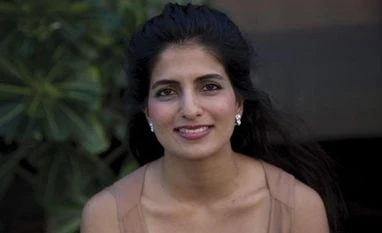When Akanksha Hazari was 15, she struck a deal with her parents. If the sport of squash, in which she was among top 20 junior players globally, got herself into Olympics, she would become a professional player. And if it did not, she would go to the university.
“Unfortunately for me, but fortunately for my parents, who didn’t want me to become a pro squash player, I went to Princeton,” says Hazari with a snigger. Now 34, Hazari is the founder & chief executive of m.Paani, a consumer loyalty startup largely targeted at the low-income group.
One of the top emerging startups in India now, m.Paani is drawing attention not only of venture capitalists like Blume Ventures and IDG Ventures, but also of global technology giant Google, which recently selected the startup to be part of for its Launchpad Studio Programme. One of the 10 companies globally to be part of the programme, m.Paani has been chosen for its vision of empowering local retailers and the next billion users with machine learning and artificial intelligence.
This is also a stamp of approval on m.Paani’s business model, the ability to collect granular consumer purchase data of people not using any technology to make those purchases. Hazari has envisioned utilising these data to build the next Google, Alibaba and Amazon.
Hazari’s decision to quit playing squash professionally was hard, but she finds solace in the fact that squash still is not part of the Olympics. Defeated she may have been, falling in line was not something she was willing to. Instead of studying medicine as her mother desired, she decided to pursue a degree in politics.
After graduating, in her first job at the Aspen Institute she worked on promoting peace between Israel and Palestine by encouraging joint business ventures. It saw her living in Jerusalem and crossing the border every single day, something which made her parents very uncomfortable.
That experience set Hazari down a path of wanting to work on impactful ventures, especially in emerging countries. After the stint of year and a half long at Booze & Co in Washington as a clean energy consultant, she moved to Mumbai, close to her hometown of Pune, where she had lived until the age of 10, to work on designing environmentally sustainable services using technology for TechnoServe.
She had initially wanted to move to Africa after her stint at Booze & Co, but she finally gave in to her father’s advice that doing so might not be such a good idea. At TechnoServe, Hazari traversed India’s hinterlands for a year, understanding how technology could change the lives of underserved rural folk and uplift them.
“This happened in 2010, which was the first mobile revolution. I was travelling the country and I could see the mobile penetration in real time. I went to small schools in villages and everyone had a mobile — that was game-changing. That’s where the idea of starting m.Paani came to my mind,” adds Hazari.
To start something of her own, Hazari felt the need to learn more about how to run a business. That is what got her to do an MBA from Cambridge University, where she formed a team of business students that ended up winning a $1-million prize from the Hult Prize Foundation for coming up with a business plan to help address water scarcity issues.
Having already decided to start her own venture, rather than working for others, Hazari refused to work with Water.org, an organisation started by Hollywood star Matt Damon. She was the only member of her team that wanted to start m.Paani for real, and while the $1-million grant was given to Water.org, a separate $300,000 grant was given to her by the Hult family.
Hazari’s tenacity gave her the capital required to start m.Paani. The startup has come up with a way to sign up consumers, mostly from lower-income groups, using their mobile numbers for a loyalty programme that could allow them to save enough to buy items such as water purifiers. Today, that scope has been expanded to other products like English textbooks, small appliances and other things that might still constitute a big purchase for buyers in rural and semi-urban regions of India.
IDG Ventures Partner Sanat Rao, who led his firm’s investment in m.Paani, said that it was one of the few ideas that had the potential to impact a billion people, something still rare in India’s technology startup ecosystem. Though Hazari’s motivation was bringing about social impact, the economics of the model are extremely strong, he says.
“For the brands, now they can target very specific customers because of the data they get and that’s how this is being funded. It’s a three-way platform of brands, small retailers and consumers. It is pretty much the only startup that has such data on these set of consumers,” adds Rao.
m.Paani uses the data to cross-sell solutions from businesses signed up on its platform (of which there are 5,000 in Mumbai today), often located in close proximity to one another. So far, the company has tracked a 30 per cent increase in the business these small retailers do. That makes them willing to pay for the service the company offers.
Hazari says m.Paani is one of the few – if not the only – services for which small businesses pay in India. And while expanding to other major cities is the goal for now, it is the data and insights derived from them that will decide what is installed next for her company.
Unlock 30+ premium stories daily hand-picked by our editors, across devices on browser and app.
Pick your 5 favourite companies, get a daily email with all news updates on them.
Full access to our intuitive epaper - clip, save, share articles from any device; newspaper archives from 2006.
Preferential invites to Business Standard events.
Curated newsletters on markets, personal finance, policy & politics, start-ups, technology, and more.
)